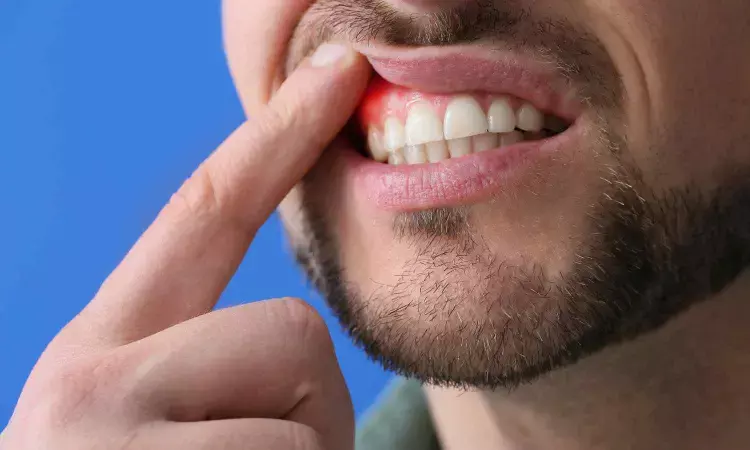- Home
- Medical news & Guidelines
- Anesthesiology
- Cardiology and CTVS
- Critical Care
- Dentistry
- Dermatology
- Diabetes and Endocrinology
- ENT
- Gastroenterology
- Medicine
- Nephrology
- Neurology
- Obstretics-Gynaecology
- Oncology
- Ophthalmology
- Orthopaedics
- Pediatrics-Neonatology
- Psychiatry
- Pulmonology
- Radiology
- Surgery
- Urology
- Laboratory Medicine
- Diet
- Nursing
- Paramedical
- Physiotherapy
- Health news
- Fact Check
- Bone Health Fact Check
- Brain Health Fact Check
- Cancer Related Fact Check
- Child Care Fact Check
- Dental and oral health fact check
- Diabetes and metabolic health fact check
- Diet and Nutrition Fact Check
- Eye and ENT Care Fact Check
- Fitness fact check
- Gut health fact check
- Heart health fact check
- Kidney health fact check
- Medical education fact check
- Men's health fact check
- Respiratory fact check
- Skin and hair care fact check
- Vaccine and Immunization fact check
- Women's health fact check
- AYUSH
- State News
- Andaman and Nicobar Islands
- Andhra Pradesh
- Arunachal Pradesh
- Assam
- Bihar
- Chandigarh
- Chattisgarh
- Dadra and Nagar Haveli
- Daman and Diu
- Delhi
- Goa
- Gujarat
- Haryana
- Himachal Pradesh
- Jammu & Kashmir
- Jharkhand
- Karnataka
- Kerala
- Ladakh
- Lakshadweep
- Madhya Pradesh
- Maharashtra
- Manipur
- Meghalaya
- Mizoram
- Nagaland
- Odisha
- Puducherry
- Punjab
- Rajasthan
- Sikkim
- Tamil Nadu
- Telangana
- Tripura
- Uttar Pradesh
- Uttrakhand
- West Bengal
- Medical Education
- Industry
1 percent metformin Gel Improves Healing in Periodontal Disease When Used with Conventional Therapy: Study

Periodontal disease is widely prevalent and often evolves into chronic tissue damage if not effectively managed. While scaling and root planing (SRP) remains the cornerstone of non-surgical therapy, researchers are actively exploring adjunctive treatments to enhance healing. A new systematic review and meta-analysis, published in The Saudi Dental Journal, evaluated the efficacy of locally delivered 1% metformin (MF) gel in improving periodontal outcomes when combined with conventional therapy.
The authors systematically analyzed six clinical trials comparing SRP plus 1% MF gel to SRP with placebo in patients with periodontitis. Follow-up was conducted at three and six months. Results showed a consistent, statistically significant improvement in key clinical parameters with the metformin gel. Pocket depth (PD) reduction averaged 1.33 mm at three months (95% CI: −1.66 to −1.01) and 1.87 mm at six months (95% CI: −2.24 to −1.39). Clinical attachment level (CAL) gain was 1.80 mm (95% CI: −2.26 to −1.34) at three months and 2.14 mm (95% CI: −2.71 to −1.58) at six months. Intra-bony defect (IBD) depth also improved by 1.16 mm (95% CI: −1.40 to −0.92) at six months. These substantial improvements suggest that metformin’s local anti-inflammatory and osteogenic properties meaningfully support periodontal healing.
The authors concluded that 1% MF gel, when used adjunctively, enhances the healing process in periodontal disease beyond the effects of SRP alone. They recommend the incorporation of this gel into clinical practice for improved management of periodontitis, especially in cases resistant to traditional treatment.
As a first-line antidiabetic agent, metformin’s repurposed use in periodontics—a field where inflammation and bone loss are central—holds exciting promise for broader host-modulation strategies in oral health.
Reference
Haba, K. S., Bencze, B., Kammerhofer, G., Ujpál, M., Bányai, D., Hermann, P., Antal, S., & Lipták, K. (2025). Locally delivered 1% metformin gel improves periodontal parameters: A systematic review and meta-analysis. The Saudi Dental Journal, 37, Article 40. https://doi.org/10.1007/s44445-025-00045-8
Dr. Shravani Dali has completed her BDS from Pravara institute of medical sciences, loni. Following which she extensively worked in the healthcare sector for 2+ years. She has been actively involved in writing blogs in field of health and wellness. Currently she is pursuing her Masters of public health-health administration from Tata institute of social sciences. She can be contacted at editorial@medicaldialogues.in.
Dr Kamal Kant Kohli-MBBS, DTCD- a chest specialist with more than 30 years of practice and a flair for writing clinical articles, Dr Kamal Kant Kohli joined Medical Dialogues as a Chief Editor of Medical News. Besides writing articles, as an editor, he proofreads and verifies all the medical content published on Medical Dialogues including those coming from journals, studies,medical conferences,guidelines etc. Email: drkohli@medicaldialogues.in. Contact no. 011-43720751


